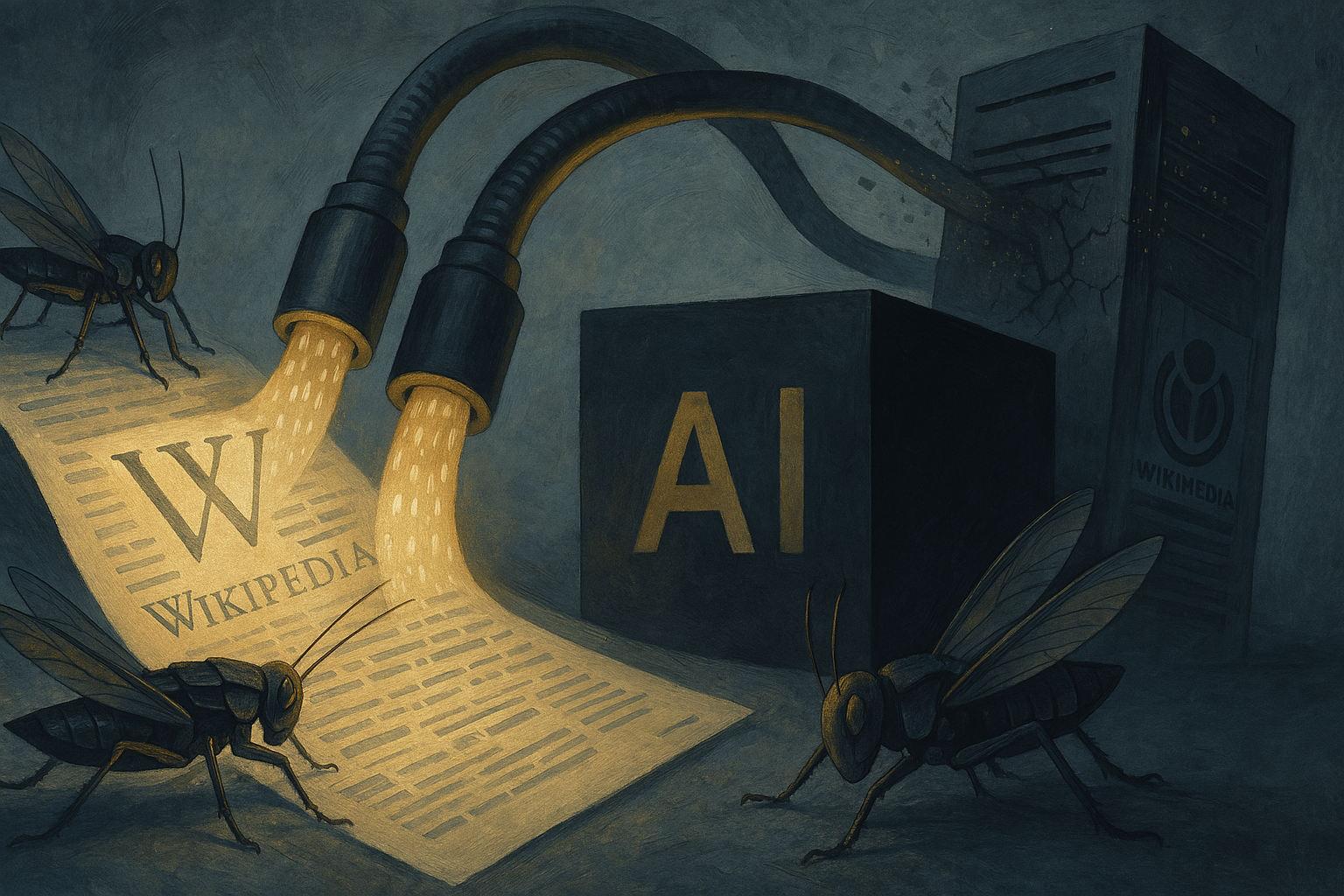Notion's AI Gamble Pays Off: From Note-Taking App to Digital Brain
In 2022, Notion's founders skipped their company offsite. Instead, they locked themselves in a room with OpenAI'

Good Morning from San Francisco,
AI bots are devouring Wikipedia whole 🤖. Traffic from digital gluttons surged 50% since early 2024, as tech companies feast on free knowledge like it's an all-you-can-eat buffet.
The feeding frenzy intensifies. Bot armies gulp down 144 million Wikimedia files, making servers wheeze. When Jimmy Carter's obituary dropped, the digital locusts nearly crashed the whole system. Talk about bad table manners 🏃♂️.
And according to O'Reilly Media's research, OpenAI's latest model is highly likely browsing behind their paywall. Their study shows 82% content recognition accuracy. Like catching someone who knows every detail of your secret cookbook but claims they've never set foot in your kitchen 🤔.
Stay curious,
Marcus Schuler

Wikimedia faces an unprecedented surge in automated traffic. AI companies are devouring its content at an alarming rate, particularly the 144 million files on Wikimedia Commons. Since early 2024, bandwidth demand for multimedia content has jumped 50%.
The culprits? Scraper bots. These digital locusts swarm Wikimedia's servers, harvesting data to train large language models. They don't just nibble - they devour. A whopping 65% of Wikimedia's most resource-intensive traffic comes from these automated guests who never bother to wipe their feet at the door.
The situation reached a breaking point during Jimmy Carter's death in December 2024. While 2.8 million humans visited his Wikipedia page, simultaneous bot activity nearly crashed the system. The Foundation's Site Reliability team scrambled to keep the lights on.
Wikimedia's infrastructure groans under this automated assault. Built to handle human traffic spikes, it now struggles with relentless bot demands. These digital visitors don't just read popular pages - they devour everything in sight, forcing requests to travel to core datacenters and multiplying costs.
Why this matters:
Read on, my dear:

A research team led by Tim O'Reilly claims OpenAI's latest model knows more about their paywalled books than it should. Their study suggests OpenAI's appetite for training data grew bolder with each model update.
The researchers point to some eyebrow-raising numbers. According to their analysis, OpenAI's GPT-4o model recognizes paywalled O'Reilly content with 82% accuracy. In their view, that's no coincidence - it's a digital fingerprint.
The study employed a crafty detection method. The team mixed authentic O'Reilly paragraphs with AI-generated alternatives, then tracked which versions GPT-4o identified. In the researchers' opinion, the model's suspicious accuracy suggests intimate familiarity with the source material.
O'Reilly and his colleagues argue the evidence shows a clear pattern. While older models like GPT-3.5 Turbo appeared to respect the velvet rope between public and private content, they believe GPT-4o crossed that line with confidence.
The authors acknowledge some uncertainty. They note that OpenAI might have gathered the content through user interactions or other means. OpenAI, meanwhile, maintains radio silence on the findings.
Why this matters:
Read on, my dear:

Prompt:
Photo for the sportswear brand Reebok commercial image, editorial style, 1995, high fashion campaign, vogue magazine, Portrait of a woman, age 37, brunette, long straight hair, brown eyes. Dressed in a white Reebok tracksuit. The girl looks into the frame, she radiates kindness and tenderness and joy, her pose demonstrates relaxation and concentration. Sports style, yoga. Studio photo for clothing advertising. Extremely strong detailing, skin texture is drawn in detail. Camera at eye level. Photographer Annie Leibovitz for Vogue magazine. 75 mm lens, frame size 16:9

Silicon Valley powerhouse Andreessen Horowitz wants a piece of TikTok. The venture firm circles the social media sensation as Trump pushes to pry it from Chinese hands before an April 5 deadline.
The numbers pack punch. TikTok raked in $36 billion globally last year, with US users filling a third of its coffers. Now Andreessen eyes a major stake alongside Oracle in a deal that would reshape the platform's future.
Marc Andreessen brings serious tech cred to the table. His firm backed Facebook early and dumped $400 million into Musk's Twitter takeover. Now he's cozying up to Team Trump, helping staff the White House AI initiative through his former partner Sriram Krishnan.
The plot thickens with Oracle's Larry Ellison, another Trump ally, angling for control of TikTok's precious US data. Meanwhile, investment giants like Blackstone hover nearby, though they're keeping their wallets relatively light with sub-billion commitments.
ByteDance's current American investors - think General Atlantic and KKR - want bigger slices of the pie. But time ticks away as April's deadline approaches.
Why this matters:
Read on, my dear:
Craft a sharp, witty poem (12 lines max) about a sophisticated cat navigating city chaos. Include one surprising plot twist. Use concrete urban details (subway grates, food carts, taxis) and show the contrast between feline dignity and urban madness.
Qualcomm just added some serious AI muscle to its roster. The chip maker nabbed VinAI's generative AI division, poaching talent straight from Vietnam's tech scene. VinAI's team brings expertise in computer vision and language models - exactly what Qualcomm needs to beef up its AI game.
Replit wants to make everyone a coder - and investors want to make Replit very rich. The AI coding startup is discussing a $200 million funding round that would catapult its valuation to $3 billion, proving that even in tech, some things still go up dramatically besides everyone's AWS bills.
A San Francisco startup just scored $20.6 million to build robot arms that scoop food in freezing warehouses - a job that humans, surprisingly, aren't fighting to keep. Chef Robotics claims its mechanical helpers have already dished out 40 million meals, probably without a single complaint about standing in 34-degree rooms all day.
AI just learned to predict wildfires with eerie accuracy, spotting trouble spots that old-school forecasts missed during the Los Angeles disaster. The new system doesn't just check the weather - it watches everything from dry brush to human behavior, catching potential blazes before they ignite.
North Korean hackers now moonlight as Europe's remote developers, with a special talent for faking their way through job interviews. These "IT warriors" have already duped companies across Germany, Portugal, and the UK - proving that in today's job market, even state-sponsored fraud can work from home.
National Security Advisor Michael Waltz and his team used personal Gmail accounts for government work, The Washington Post reveals. The practice continues even after Waltz criticized Hillary Clinton for similar behavior and accidentally added a journalist to a sensitive military Signal chat.
Users weaponize Elon Musk's chatbot Grok to win arguments on X, turning what should be a helpful AI assistant into social media's snarkiest fact-checker. Instead of fostering better discussions, it's become the internet's most expensive "well, actually" machine.
Elon Musk just merged his Twitter replacement X with his AI startup xAI in a $110 billion deal that uses all the financial rigor of trading Pokémon cards. He even used the same lawyers for both sides - because who needs rules when you're playing with your own deck?
Raspberry Pi's profits melted by half as the tiny computer maker struggled with a massive inventory hangover. The British tech firm shipped 1.9 million of its credit card-sized gadgets but watched profits shrivel to $16.3 million.

Microsoft's AI found dangerous security flaws in bootloaders that could let attackers seize control of millions of devices.
Security Copilot, Microsoft's AI assistant, discovered 20 vulnerabilities across popular open-source boot software including GRUB2, U-boot, and Barebox.
These bootloaders handle the critical first steps when computers power on. The bugs Microsoft found could let attackers bypass secure boot protections and install malicious code that survives even complete system reinstalls.
Security Copilot proved remarkably efficient. It saved researchers about a week of manual code review by rapidly identifying risky areas in filesystem code. The AI flagged potential issues that human analysts then verified and expanded upon.
The findings highlight an awkward truth: critical open-source code often gets recycled between projects, spreading vulnerabilities far and wide. Several bugs Microsoft found in GRUB2 had infected other bootloaders through copied code.
Microsoft disclosed the flaws responsibly. All affected projects released patches in February 2025. But the episode serves as a wake-up call about AI's growing role in cybersecurity - for both defense and potential attacks.
Why this matters:
Read on, my dear:

Rytr burst onto the AI writing scene in 2021, challenging content creators to ditch writer's block forever. Its platform transforms basic prompts into polished prose across 40+ formats, from blog posts to ad copy.
• The founders ⭐
Founded in 2021 by Abhi Godara and Atul Yadav. Godara brought strategy consulting experience from his LSE background, while Yadav contributed software development expertise. The Delaware-registered startup employs a globally distributed team that tackled the frustration of inefficient content creation head-on.
• The product 💪
Rytr generates human-like content in seconds across 40+ templates. Strengths include multilingual support (40+ languages), voice-training capability to match your brand tone, integrated plagiarism checking, and AI image generation. Users can expand, shorten, or rephrase text with one click, organize content into projects, and collaborate with team members.
• The competition 🥊
Jasper, Copy.ai, Writesonic, and Writer crowd the AI writing space. Rytr carved its niche through budget-friendly pricing and user-friendly design. While competitors like Jasper secured billion-dollar valuations, Rytr focused on product quality, building a 7-8 million user base including companies like Dell and IKEA.
• Financing 💰
Bootstrapped by its founders without traditional VC backing. Rytr skipped funding rounds and instead achieved exit through acquisition by Copysmith in October 2022. The deal value remains undisclosed. Post-acquisition, Rytr became part of the "Copyrytr" suite alongside another acquired tool, Frase.
• The future ⭐⭐⭐⭐
The generative AI market explodes toward $130 billion by 2030. Rytr's integration into Copysmith's ecosystem positions it to leverage complementary SEO tools while maintaining its core strength in user-friendly content generation. Regulatory challenges loom—the FTC already prohibited Rytr from offering AI-generated review writing. Rytr must differentiate as AI writing becomes commoditized.
Fuel your morning with AI insights. Lands in your inbox 6 a.m. PST daily. Grab it free now! 🚀